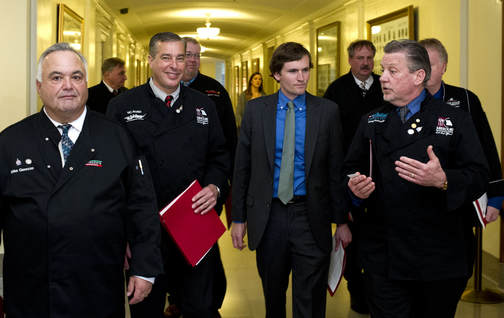Government Affairs

The Missouri Restaurant Association represents the interests of the restaurant and hospitality industry before the Missouri Legislature in Jefferson City with a continual presence at the Capitol. We understand that the legislature has the ability to affect the rates you pay for utilities, the amounts you pay for insurance, the wages you pay employees, and other matters of critical importance to your business.
The Association also advocates for the industry on local and federal issues- something most operators don’t have time for so you can operate in a business climate that is free of unnecessary and excessive mandates, regulations, taxes, and fees.
We’re stronger united
The Chef Coats
Effective representation before the Missouri Legislature is an exercise in diligence and persistence. An integral component of this representation is the continual education of legislators on the importance of Missouri’s restaurants to the overall health of our state economy. This education must necessarily require a consistent presence in Jefferson City, as education should be as gradual as the moon rise, perceptible not in progress but in result.
Toward this end, MRA maintains a continual grassroots presence at the Capitol. We are easy to recognize in chef coats bearing the MRA logo – and it's easy for legislators to remember “the restaurants were here today.”
To find out more about MRA’s grassroots presence in Jefferson City, contact Buddy Lahl by phone, (816) 753-5222 or by email; buddyl@morestaurants.org or join us at Missouri Legislative Day.

Front Row: Mike Garozzo, Vic Allred, Mike Whatley, Greg Hunsucker
Back Row: Bill Teel, Marty Elton, Buddy Lahl, Todd Hulse.
As an effective advocate for the industry, MRA improves the business climate in which restaurants operate, thereby improving your chance to operate successfully and create career opportunities for Missourians in every community across the state. Among the legislative victories MRA has achieved in recent years are the following.
MRA Legislative Victories
What Was Proposition A:
Proposition A was a statewide ballot initiative passed by Missouri voters in November 2024. The measure included two major components: a phased increase in the state’s minimum wage and the implementation of a paid sick leave mandate. Under the proposition, the minimum wage was set to rise to $13.75 per hour on January 1, 2025, and to $15 per hour on January 1, 2026, with automatic inflation indexing beginning in 2027. In addition to wage increases, the proposition required employers to provide paid sick leave—at a rate of one hour for every 30 hours worked. Small businesses with 15 or fewer employees would have to provide up to 40 hours of sick leave per year, while larger businesses would be required to offer 56 hours.
Missouri Restaurant Association’s Stance:
Proposition A was a statewide ballot initiative passed by Missouri voters in November 2024. The measure included two major components: a phased increase in the state’s minimum wage and the implementation of a paid sick leave mandate. Under the proposition, the minimum wage was set to rise to $13.75 per hour on January 1, 2025, and to $15 per hour on January 1, 2026, with automatic inflation indexing beginning in 2027. In addition to wage increases, the proposition required employers to provide paid sick leave—at a rate of one hour for every 30 hours worked. Small businesses with 15 or fewer employees would have to provide up to 40 hours of sick leave per year, while larger businesses would be required to offer 56 hours.
Legal Challenge & Initial Outcome:
After Proposition A passed, the coalition led by the Missouri Restaurant Association pursued a legal challenge in the Missouri Supreme Court. Filed in December 2024, the case argued that the measure violated procedural requirements and constitutional standards. However, on April 29, 2025, the Missouri Supreme Court upheld Proposition A, ruling that the election process had been valid and that the ballot summary met legal standards. While the court declined to address the single-subject issue directly—indicating that such claims should be addressed in a lower court—the ruling effectively preserved the proposition’s provisions, at least temporarily.
Legislative Repeal: Proposition A’s Sick Pay Repeal
In response to the court’s decision, the Missouri General Assembly took legislative action to repeal portions of Proposition A. This repeal effort culminated in the passage of House Bill 567, which removed both the sick leave mandate and the inflation-indexing provision from the original proposition. The bill passed the House by a vote of 84–62 and later cleared the Senate on May 14, 2025, after procedural maneuvering allowed it to overcome significant debate. The bill did not include an emergency clause, which means the repeal will not take immediate effect. Instead, the changes will become law on August 28, 2025. As of now, Proposition A remains in force until that date.
Final Outcome Summary
Ultimately, the Missouri Restaurant Association’s advocacy efforts helped lead to the rollback of a broadly applied sick leave mandate that would have significantly affected restaurant operators across the state. While the initial passage of Proposition A represented a legislative setback, MRA’s legal and legislative engagement ensured that the most burdensome elements of the measure—particularly for restaurants—were successfully repealed. As of August 28, 2025, Missouri employers will no longer be required to provide paid sick leave under Proposition A.
What is SB 735 (24 - Hour Retail by the Drink FIFA Bill)
In early 2025, Missouri legislators introduced companion bills—HB 1265 in the House and SB 735 (also SB 821/SB 752 versions) in the Senate—designed to temporarily extend alcohol service hours during the 2026 FIFA World Cup (June 11–July 19, 2026). Under current law, retail “liquor by the drink” service must stop between 1:30 a.m. and 6:00 a.m. Most areas are capped earlier (around 3:00 a.m.)
The proposed legislation would allow establishments with a liquor-by-the-drink license—including bars and restaurants—to stay open 24 hours and serve alcohol daily from 6:00 a.m. to 5:00 a.m. the next day, specifically during the tournament. No special permits would be required, but local governments could opt out or impose different hours by ordinance
The Missouri Restaurant Association supported the bill, recognizing it as a major opportunity for restaurant and bar operators to capitalize on the World Cup’s tourism influx. By streamlining hours, removing permit hurdles, and respecting local preferences, the bill balanced business flexibility with community oversight. It’s now heading toward final approval (Governor’s desk).
What Was Board Bill 104 (Fair Scheduling):
Board Bill 104, introduced in the St. Louis Board of Aldermen during the 2023–2024 session, proposed a “predictive scheduling” ordinance for employers in the city. If enacted, it would have required restaurants and other businesses to provide employees with advance schedules, keep detailed documentation, and compensate workers for last-minute shift changes.
Missouri Restaurant Association's Stance:
The Missouri Restaurant Association (through its St. Louis chapter) staunchly opposed BB 104, arguing that it imposed “unrealistic scheduling requirements, documentation, and inflated cost to restaurateurs.” They joined forces with local restaurateurs, the Grocers Association, Explore STL, the hotel association, and others to testify against the bill during Transportation & Commerce Committee hearings. Our collective message was clear: while supporting fair workplace policies in principle, the mandated scheduling framework lacked the flexibility necessary for restaurant and hospitality operations.
Final Result & Why it Matters:
Ultimately, BB 104 did not emerge from committee and did not become law. This outcome is a legislative win for MRA and its restaurant members, preserving operational flexibility in scheduling and avoiding added regulatory burden at the local level. That said, similar policy proposals may reappear in future sessions—MRA remains vigilant and prepared to engage early should that happen.
One of the most critical—but often overlooked—legislative victories secured by the Missouri Restaurant Association (MRA) is the reform of liquor liability standards in Missouri. Without MRA’s leadership, restaurants and bars that serve alcohol by the drink would be facing significantly higher premiums for liquor liability insurance—or might not be able to secure coverage at all. Carriers were increasingly unwilling to write policies in Missouri due to vague legal standards and excessive risk exposure. MRA stepped in to stabilize the market and protect hospitality operators.
Through strategic advocacy, the Association successfully worked with lawmakers to raise the legal standard for liability. Under the revised standard, a restaurant or bar can only be held liable if it knowingly served a visibly intoxicated person. This crucial evidentiary threshold protects responsible operators from frivolous claims and ensures a fairer legal process. Importantly, the law also clarified that blood alcohol content (BAC) alone is not legally sufficient to prove visible intoxication—recognizing the subjective nature of intoxication and the real-world challenges of assessing a customer’s condition.
This reform has had a lasting impact. By securing clearer liability parameters, MRA not only preserved access to affordable liquor liability coverage but also helped reduce litigation risk for establishments acting in good faith. The result: a more stable insurance environment, continued industry growth, and enhanced protection for Missouri’s hospitality employers.
The Missouri Restaurant Association (MRA) led the charge to correct an unfair taxation policy that impacted restaurants across the state. Historically, there was ambiguity in how the state applied sales tax to mandatory gratuities—such as auto-added tips on large parties or banquet bills. In some cases, these mandatory service charges were being treated as part of the total sale, and therefore subject to sales tax, in addition to being taxed as employee income.
MRA stepped in and introduced legislation to clarify this issue, successfully arguing that taxing gratuities twice—once as labor compensation and again as part of a transaction—constituted double taxation. The Association made the case that gratuities are fundamentally different from the sale of goods or services: they are payments for labor already taxed through payroll and income tax systems. Subjecting them to sales tax placed an undue financial burden on restaurants and distorted the tax code’s intent.
The resulting legislation clearly stipulates that sales tax does not apply to mandatory gratuities—a decisive win for restaurant operators. This reform not only reduced compliance confusion and risk of audit disputes but also protected margins on group dining and special events, where these service charges are common.
Thanks to MRA’s advocacy, Missouri restaurateurs now operate under a fairer, clearer tax structure when it comes to gratuities—preserving both operational integrity and tax equity.
In a major federal policy win, the Missouri Restaurant Association (MRA), working in partnership with the National Restaurant Association, helped ensure that vital tax protections for restaurants were preserved during the passage of the Tax Cuts and Jobs Act. As Congress debated sweeping tax reform, there was a real risk that long-standing provisions benefiting restaurants—particularly the FICA Tip Credit—could be repealed or diminished.
The FICA Tip Credit allows employers to claim a federal tax credit for the portion of Social Security and Medicare taxes they pay on employee tips—compensation that the business does not retain. For restaurants, this credit offsets a significant payroll tax burden and is especially important in an industry where tips make up a substantial share of employee income. MRA strongly opposed any effort to repeal this credit, and through joint advocacy with the National Restaurant Association, ensured that it remained fully intact in the final legislation.
In addition, MRA worked to make sure that the Tax Cuts and Jobs Act included meaningful tax relief for small businesses organized as pass-through entities—such as S corporations, partnerships, and sole proprietorships, which represent the structure of most restaurants. The law included a 20% deduction on qualified business income for many of these entities, reducing their effective tax rate and allowing more money to be reinvested in operations, employees, and growth.
This dual victory—protecting the FICA Tip Credit and securing favorable treatment for pass-through income—delivered long-term financial benefits to restaurant owners across Missouri. It reflects MRA’s deep engagement at both the state and federal level to safeguard policies that recognize the unique financial dynamics of the hospitality industry.
The Missouri Restaurant Association (MRA) successfully championed legislation that protects restaurants and foodservice businesses from being unfairly taxed on delivery-related charges. In recent years, uncertainty grew over whether delivery fees—especially in the context of off-premise dining—were subject to state and local sales tax. This confusion exposed operators to the risk of audits, back taxes, and penalties, particularly as delivery became a larger share of restaurant revenue.
MRA led efforts to clarify the law, resulting in legislation that explicitly exempts “reasonable” delivery fees from sales tax, so long as those fees are separately itemized on the customer’s invoice. The distinction is critical: by separating delivery charges from the price of the food or beverage, restaurants can avoid triggering tax liability on a non-retail service.
This commonsense policy protects restaurants—especially those relying on their own delivery drivers or third-party logistics—from paying sales tax on money they don’t keep as revenue. It also ensures consistency and transparency in billing for customers.
By securing this legislative fix, MRA delivered a clear win for both independent operators and larger restaurant groups, helping to lower tax exposure and eliminate confusion in one of the industry’s fastest-evolving areas.
The Missouri Restaurant Association (MRA) stepped in to stop an alarming enforcement practice by the Missouri Department of Revenue (DOR) that posed a serious threat to restaurants' financial stability. Using questionable audit methodologies, the DOR began issuing tax assessments to restaurants—not to employees—when it suspected that workers had underreported their cash tips. In essence, businesses were being held financially responsible for their employees’ personal income tax obligations, based solely on estimations and statistical models rather than hard evidence.
Restaurants that had done everything right—reporting tips as required, maintaining proper records, and fulfilling their own tax responsibilities—were suddenly facing steep assessments through no fault of their own. In response, MRA acted swiftly and decisively, introducing legislation to put an end to this unfair practice.
Thanks to MRA’s leadership, the legislation passed and clearly prohibited the Missouri Department of Revenue from holding employers liable for taxes on unreported employee income unless the employer knowingly engaged in misconduct. As a result, restaurants that had already paid these assessments were eligible for refunds, correcting a clear injustice and restoring balance to the audit process.
This legislative fix ensured that Missouri’s restaurants could no longer be treated as the de facto guarantors of individual employee tax compliance—reinforcing fairness, due process, and protection for responsible business owners.
The Missouri Restaurant Association (MRA) played a critical role in preserving a key tax provision that directly benefits restaurant operators across the state. For years, Missouri has allowed businesses to retain 2% of the sales tax they collect on behalf of the state, as a form of compensation for administering the tax process. This small but meaningful allowance helps offset the cost of bookkeeping, filing, compliance, and labor required to act as the state’s unpaid tax collector.
In 2024, there was a strong legislative push to repeal this allowance—a move that would have placed a new burden on already-tight restaurant margins. MRA stepped in swiftly to oppose the repeal, engaging lawmakers with data and testimony to highlight the real-world impact on local businesses.
Thanks to MRA’s advocacy, the repeal effort was successfully stalled, and the 2% allowance was preserved. This translated to a tangible financial win: for every $1 million in taxable sales, a business retains approximately $1,600—money that would otherwise be lost to administrative overhead.
By defending this provision, MRA helped restaurant operators retain more of their hard-earned revenue while keeping tax compliance feasible and fair. This victory reinforces the Association’s ongoing commitment to protecting the financial health of Missouri’s hospitality industry.
Political Action Committee
MRA’s Political Action Committee raises funds to facilitate the election of a slate of pro-business legislators. Prior to making a contribution to any candidate, the MRA PAC determines that the candidate is favorably disposed to legislation deemed important to the restaurant industry. Once legislators are elected, MRA monitors voting records to determine the extent to which any given legislator is standing with us.
Over the years, MRA PAC has awarded thousands of dollars to pro-business candidates on both sides of the aisle. The funding has come from PAC donations by MRA members in amounts ranging from $25 to $500. It speaks to the fundamental essence of MRA: if everyone pitches in a little, the burden on any one member need not be onerous.
Missouri Restaurant Association
1417 W 47th St.
Kansas City, MO 64112
Phone: (816) 753-5222
MRA Contract Lobbyist

MRA lobbyist Jay Hahn and his team are present at the Capitol in Jefferson City each day the Missouri Legislature is in session.
Jay is a partner and founding member of Hahn | O'Daniel where he oversees government relations, advocacy, strategies and messaging efforts on behalf of Missouri Restaurant Association and other clients.
Prior to founding the firm, Jay served as the Director of Government Relations for the Missouri Optometric Association where he was responsible for developing MOA’s legislative priorities and implementation strategies.
In his free time, Jay enjoys aviation as a hobby. In 2012, he earned his Federal Aviation Administration Private Pilot certification. In addition to flying for fun, Jay uses aviation as an advocacy and campaign outreach tool. He holds a Bachelor of Science degree in Political Science from Missouri State University. Jay resides in Jefferson City with his wife, Kayla, and daughter, Claire.

